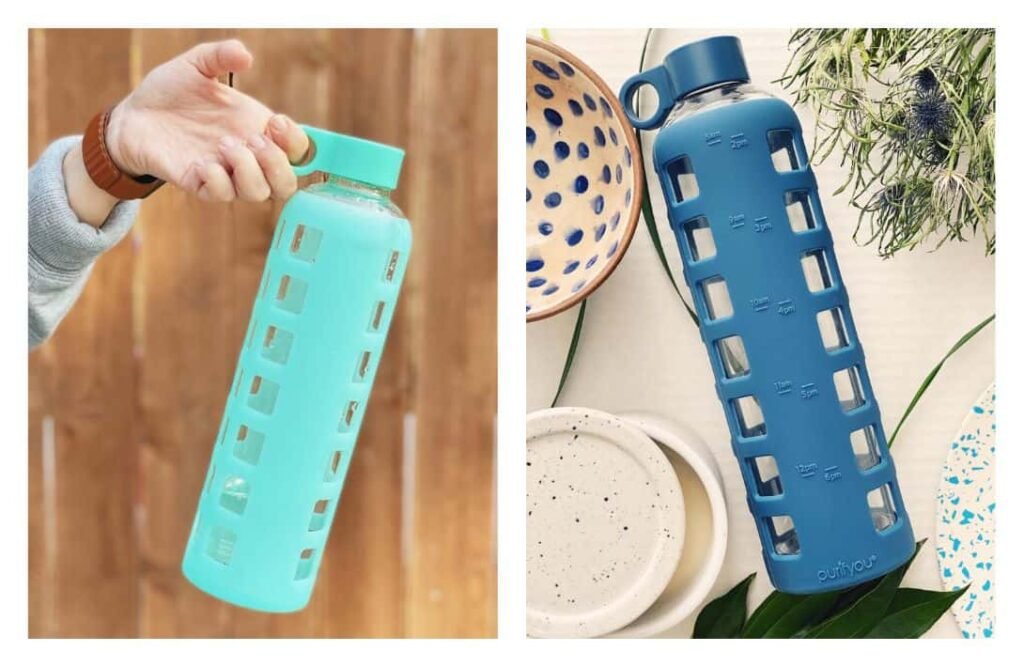Alternatives to Plastic Water Bottles: Eco-Friendly Solutions Explored

As the world becomes more aware of the environmental impact of single-use plastics, many people are seeking alternatives to plastic water bottles. Plastic water bottles contribute significantly to pollution, both in the production process and as waste. They take hundreds of years to decompose, and even then, they break down into microplastics that continue to pollute the environment. Furthermore, the production of plastic water bottles uses a significant amount of energy and resources, contributing to climate change. In this article, we will explore a variety of eco-friendly alternatives to plastic water bottles, discussing their benefits and potential drawbacks.
- Understanding the Problem with Plastic Water Bottles
- Why Choose Eco-Friendly Alternatives?
- Exploring Glass Water Bottles
- The Benefits of Ceramic Water Bottles
- Stainless Steel Water Bottles: A Durable Choice
- Plant-Based Plastic Water Bottles: A Greener Plastic
- Boxed Water and Paper Bottles: A Novel Approach
- Reusable Water Bottles: A Simple Solution
- Bamboo Water Bottles: Harnessing Nature's Resources
- Copper Water Bottles: An Ancient Tradition
- Aluminum Water Bottles: Lightweight and Recyclable
- Biodegradable Water Bottles: Breaking Down the Problem
- Compostable Water Bottles: Turning Waste into Wealth
- Recycled Material Water Bottles: Closing the Loop
- Collapsible Water Bottles: Convenience Meets Sustainability
- Filtered Water Bottles: Clean Water on the Go
- Natural Clay or Stone Water Bottles: Back to Basics
- Silicone Water Bottles: Flexibility and Function
- Carbon Offset Water Bottles: Balancing the Scales
- Renewable Resource Water Bottles: A Sustainable Cycle
- Lifetime Warranty Water Bottles: A Long-Term Commitment
- Water Bottles for a Cause: Making Every Purchase Count
- Conclusion: Choosing the Right Eco-Friendly Water Bottle for You
Understanding the Problem with Plastic Water Bottles
Plastic water bottles are a major source of pollution. According to the Container Recycling Institute, more than 60 million plastic bottles end up in landfills and incinerators every day. These bottles take up to 1,000 years to decompose, releasing toxic chemicals into the soil and water in the process. Additionally, the production of plastic water bottles uses a significant amount of energy and resources. It takes more than 1.5 million barrels of oil to produce a year's supply of bottled water in the U.S. alone, which is enough to fuel 100,000 cars for a year. This is not to mention the energy used to transport and refrigerate bottled water. Clearly, there is a need for alternatives to plastic water bottles.
Why Choose Eco-Friendly Alternatives?
Choosing eco-friendly alternatives to plastic water bottles can have a significant positive impact on the environment. By reducing our reliance on single-use plastics, we can decrease pollution, conserve resources, and mitigate climate change. Additionally, many eco-friendly water bottles are more durable and cost-effective in the long run than disposable plastic bottles. They can also be healthier, as some plastic bottles can leach harmful chemicals into the water, especially when exposed to heat. Finally, choosing an eco-friendly water bottle can be a simple and effective way to demonstrate your commitment to environmental sustainability.
Exploring Glass Water Bottles
One of the most popular alternatives to plastic water bottles is glass. Glass water bottles are free from harmful chemicals found in some plastics, such as BPA, and they do not affect the taste of the water. They are also fully recyclable and can be reused indefinitely without losing their quality or safety. However, glass water bottles are heavier and more fragile than plastic bottles, which can make them less convenient for on-the-go use. They can also be more expensive. Despite these drawbacks, many people find the benefits of glass water bottles to be worth the trade-offs.
The Benefits of Ceramic Water Bottles
Ceramic water bottles are another eco-friendly alternative to plastic. Like glass, ceramic is free from harmful chemicals and does not affect the taste of the water. Ceramic water bottles are also durable and long-lasting. They can be a stylish and unique choice, with many beautiful designs available. However, ceramic water bottles are also heavier and more fragile than plastic, and they can be more expensive. Additionally, they are not transparent, so you cannot see how much water is left inside. Despite these potential drawbacks, ceramic water bottles are a safe and sustainable choice for those seeking alternatives to plastic water bottles.
Stainless Steel Water Bottles: A Durable Choice
Stainless steel water bottles are a durable and versatile alternative to plastic. They are lightweight, robust, and resistant to stains and odors. Stainless steel water bottles can also keep drinks hot or cold for several hours, making them a great choice for a variety of beverages. Like glass and ceramic, stainless steel is free from harmful chemicals and does not affect the taste of the water. However, stainless steel water bottles can be more expensive than plastic, and they can dent if dropped. Despite these potential drawbacks, stainless steel water bottles are a popular choice for those seeking alternatives to plastic water bottles.
Plant-Based Plastic Water Bottles: A Greener Plastic
For those who prefer the convenience of plastic but want to reduce their environmental impact, plant-based plastic water bottles can be a good option. These bottles are made from renewable resources such as corn or sugarcane, rather than fossil fuels. They are also biodegradable under certain conditions, making them a more sustainable choice than traditional plastic. However, it's important to note that not all plant-based plastics are created equal. Some can still take a long time to decompose and may require industrial composting facilities. Additionally, the production of plant-based plastics can still use a significant amount of energy and resources. Therefore, while plant-based plastic water bottles are a step in the right direction, they are not a perfect solution.
Boxed Water and Paper Bottles: A Novel Approach
Boxed water and paper bottles are a novel approach to the problem of plastic pollution. These alternatives to plastic water bottles are made from renewable resources and are fully recyclable. They are also lightweight and compact, making them convenient for on-the-go use. However, like plant-based plastics, boxed water and paper bottles still have an environmental impact. The production of paper products requires a significant amount of water and energy, and the boxes or bottles must be recycled properly to realize their environmental benefits. Additionally, they may not be as durable or long-lasting as other alternatives. Despite these potential drawbacks, boxed water and paper bottles can be a more sustainable choice than plastic for single-use scenarios.
Reusable Water Bottles: A Simple Solution
One of the simplest and most effective alternatives to plastic water bottles is to use a reusable water bottle. Reusable water bottles can be made from a variety of materials, including glass, stainless steel, and safe plastics. They are durable, cost-effective, and can be used indefinitely, reducing waste and saving resources. However, reusable water bottles require regular cleaning to prevent the growth of bacteria and mold. They can also be heavier and less convenient than disposable bottles. Despite these potential drawbacks, reusable water bottles are a popular choice for those seeking to reduce their environmental impact.
Bamboo Water Bottles: Harnessing Nature's Resources
Bamboo water bottles are a unique and sustainable alternative to plastic. Bamboo is a renewable resource that grows quickly and absorbs carbon dioxide, making it an eco-friendly choice. Bamboo water bottles are lightweight, durable, and naturally antibacterial. They can also be a stylish and unique choice, with a natural and organic aesthetic. However, bamboo water bottles can be more expensive than plastic, and they require careful cleaning to prevent the growth of mold. Despite these potential drawbacks, bamboo water bottles are a great choice for those seeking alternatives to plastic water bottles that harness nature's resources.
Copper Water Bottles: An Ancient Tradition
Copper water bottles are a traditional alternative to plastic that has been used for centuries in cultures around the world. Copper has natural antibacterial properties and can improve the taste of water. It is also fully recyclable and can last a lifetime if cared for properly. However, copper water bottles can be more expensive than plastic, and they can tarnish over time. They also require regular cleaning to maintain their properties and appearance. Despite these potential drawbacks, copper water bottles are a durable and sustainable choice for those seeking alternatives to plastic water bottles.
Aluminum Water Bottles: Lightweight and Recyclable
Aluminum water bottles are a lightweight and recyclable alternative to plastic. They are durable, resistant to stains and odors, and can keep drinks hot or cold for several hours. Aluminum water bottles are also often cheaper than stainless steel or glass bottles, making them a cost-effective choice. However, aluminum can react with certain beverages, so most aluminum water bottles have a lining to prevent this. This lining can sometimes contain harmful chemicals, so it's important to choose a bottle from a reputable manufacturer. Despite these potential drawbacks, aluminum water bottles are a popular choice for those seeking alternatives to plastic water bottles.
Biodegradable Water Bottles: Breaking Down the Problem
Biodegradable water bottles are designed to break down more quickly and completely than traditional plastic bottles. They are made from a variety of materials, including plant-based plastics and natural fibers. Biodegradable water bottles can be a good choice for single-use scenarios where recycling is not possible. However, it's important to note that not all biodegradable materials are created equal. Some require specific conditions to decompose, and others can still take a long time to break down. Additionally, the production of biodegradable materials can still use a significant amount of energy and resources. Therefore, while biodegradable water bottles are a step in the right direction, they are not a perfect solution.
Compostable Water Bottles: Turning Waste into Wealth
Compostable water bottles are similar to biodegradable bottles, but they are designed to break down into nutrient-rich compost under the right conditions. They are made from a variety of materials, including plant-based plastics and natural fibers. Compostable water bottles can be a good choice for single-use scenarios where recycling is not possible, and they can contribute to a circular economy by turning waste into a valuable resource. However, like biodegradable bottles, compostable bottles require specific conditions to decompose, and they can still take a long time to break down. Additionally, the production of compostable materials can still use a significant amount of energy and resources. Therefore, while compostable water bottles are a step in the right direction, they are not a perfect solution.
Recycled Material Water Bottles: Closing the Loop
Water bottles made from recycled materials are a sustainable choice that helps to close the loop of consumption and waste. These bottles can be made from a variety of materials, including recycled plastics, glass, and metals. They are often just as durable and functional as new bottles, and they can be recycled again at the end of their life. However, not all recycled materials are created equal. Some can still contain harmful chemicals, and others can be less durable or functional than new materials. Therefore, it's important to choose a bottle from a reputable manufacturer that uses safe and high-quality recycled materials.
Collapsible Water Bottles: Convenience Meets Sustainability
Collapsible water bottles are a convenient and sustainable alternative to plastic. They are made from flexible materials such as silicone, which can be folded or rolled up when not in use. This makes them compact and lightweight, perfect for travel or on-the-go use. Collapsible water bottles are also often made from safe and durable materials that can be used indefinitely. However, they can be more difficult to clean than rigid bottles, and they may not be as durable or long-lasting. Despite these potential drawbacks, collapsible water bottles are a great choice for those seeking alternatives to plastic water bottles that combine convenience and sustainability.
Filtered Water Bottles: Clean Water on the Go
Filtered water bottles are a practical and eco-friendly alternative to bottled water. They have a built-in filter that removes impurities from tap water, providing clean and safe drinking water wherever you go. Filtered water bottles can be made from a variety of materials, including glass, stainless steel, and safe plastics. They can save money and reduce waste by eliminating the need for bottled water. However, the filters need to be replaced regularly, which can add to the cost and waste. Despite these potential drawbacks, filtered water bottles are a popular choice for those seeking alternatives to plastic water bottles.
Natural Clay or Stone Water Bottles: Back to Basics
Natural clay or stone water bottles are a traditional and eco-friendly alternative to plastic. They are made from natural materials that are abundant and renewable. Clay or stone water bottles can keep water cool naturally, and they can add minerals to the water that are beneficial for health. However, they can be heavy and fragile, and they require careful cleaning to prevent the growth of bacteria or mold. Despite these potential drawbacks, natural clay or stone water bottles are a unique and sustainable choice for those seeking alternatives to plastic water bottles.
Silicone Water Bottles: Flexibility and Function
Silicone water bottles are a flexible and functional alternative to plastic. They are made from silicone, a durable and safe material that is resistant to heat and cold. Silicone water bottles are lightweight and flexible, making them convenient for on-the-go use. They are also easy to clean and can be used indefinitely. However, silicone can absorb odors and tastes, so it may not be the best choice for those who are sensitive to these factors. Despite these potential drawbacks, silicone water bottles are a popular choice for those seeking alternatives to plastic water bottles.
Carbon Offset Water Bottles: Balancing the Scales
Carbon offset water bottles are a unique and innovative solution to the environmental impact of bottled water. These bottles are made by companies that offset the carbon emissions from the production and transportation of the bottles by investing in renewable energy projects or other carbon reduction initiatives. This makes them a more sustainable choice than traditional bottled water. However, it's important to note that carbon offsetting is not a perfect solution. It does not eliminate the emissions from the production and transportation of the bottles, and it can be difficult to verify the effectiveness of the offset projects. Therefore, while carbon offset water bottles are a step in the right direction, they are not a perfect solution.
Renewable Resource Water Bottles: A Sustainable Cycle
Water bottles made from renewable resources are a sustainable choice that helps to reduce the environmental impact of bottled water. These bottles can be made from a variety of materials, including plant-based plastics, bamboo, and natural fibers. They are often biodegradable or compostable, and they can be made from rapidly renewable resources that absorb carbon dioxide as they grow. However, like other eco-friendly materials, renewable resource water bottles can still have an environmental impact in terms of the energy and resources used in their production. Therefore, it's important to choose a bottle from a reputable manufacturer that uses sustainable practices.
Lifetime Warranty Water Bottles: A Long-Term Commitment
Water bottles with a lifetime warranty are a durable and cost-effective alternative to disposable bottles. These bottles are made by companies that stand behind their products and are willing to repair or replace them if they fail. This can save money and reduce waste in the long run. Lifetime warranty water bottles can be made from a variety of materials, including stainless steel, glass, and safe plastics. However, it's important to read the warranty carefully, as it may not cover all types of damage or wear and tear. Despite these potential drawbacks, lifetime warranty water bottles are a
great choice for those seeking alternatives to plastic water bottles that offer a long-term commitment.
Water Bottles for a Cause: Making Every Purchase Count
Water bottles for a cause are a meaningful and impactful way to reduce the environmental impact of bottled water. These bottles are made by companies that donate a portion of their profits to environmental or social causes. This can make every purchase count towards a better world. Water bottles for a cause can be made from a variety of materials, including glass, stainless steel, and safe plastics. They can also be a great way to show your support for a cause you care about. However, it's important to research the company and the cause to ensure that your purchase is truly making a difference. Despite these potential considerations, water bottles for a cause are a popular choice for those seeking alternatives to plastic water bottles that make every purchase count.
Conclusion: Choosing the Right Eco-Friendly Water Bottle for You
There are many eco-friendly alternatives to plastic water bottles available today. From glass and stainless steel to bamboo and plant-based plastics, there is an option to suit every lifestyle and preference. When choosing a water bottle, it's important to consider factors such as durability, cost, convenience, and the environmental impact of the material. It's also important to choose a bottle from a reputable manufacturer that uses safe and sustainable practices. By making the switch to an eco-friendly water bottle, you can reduce your environmental impact, save money, and enjoy a better tasting and healthier drink. So why wait? Start exploring the alternatives to plastic water bottles today!





Leave a Reply